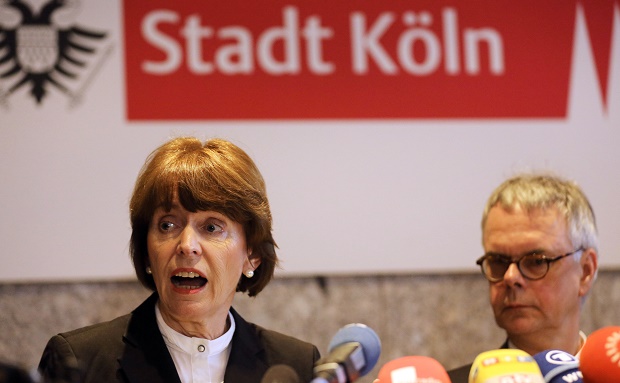
Cologne mayor Henriette Reker , left, and the head of Cologne’s police, Wolfgang Albers, attend a news conference in Cologne, western Germany, Tuesday Jan. 5, 2016. The mayor of Cologne condemned a series of sexual assaults in the western German city on New Year’s Eve, calling Tuesday for the perpetrators to be “prosecuted in the toughest possible way.” Police say dozens of women reported being sexually assaulted and robbed around Cologne’s main train station, next to the city’s famous cathedral, during the night from Thursday to Friday. At least 90 criminal complaints have been filed, including one allegation of rape. dpa via AP FILE PHOTO
COLOGNE, Germany—The German city of Cologne, still shaken by a spate of sexual assaults in a crowd of migrants on New Year’s Eve, was braced Saturday for a rally of the xenophobic PEGIDA movement.
The Islamophobic protest was planned from 1300 GMT in the central square where hundreds of women last week ran a gauntlet of groping hands, lewd insults and robberies in mob violence that has shocked Germany.
READ: New Year’s sex assaults stoke German migrant debate
Most of the assailants were of Arabic or North African background, according to eye-witnesses, police and media reports.
Far-right groups have pointed to the assaults, including two reported rapes, as proof that Chancellor Angela Merkel’s liberal migrant policy—which brought 1.1 million new asylum seekers to Germany last year—is driving the country into chaos.
READ: Germany says no plans to limit Syrians’ asylum rights
The co-founder of PEGIDA, short for “Patriotic Europeans Against the Islamisation of the Occident,” Lutz Bachmann, posted a photo of himself on social media with the slogan “Rape Refugees not Welcome.”
In a similar vein, a leader of the populist right-wing Alternative for Germany party, which has polled at around 10 percent in surveys ahead of several state elections this year, claimed that the events gave a “taste of the looming collapse of culture and civilisation.”
Police expect around 1,000 backers of PEGIDA and the local far-right group Pro NRW, as well as counter-demonstrators from the group “Cologne against Right-wingers,” local media said.
Frenzied crush
The mob violence at the start of 2016 has heightened popular fears of worse to come, and threatened to tip what was long a broadly welcoming mood that last September saw crowds cheering Syrian refugees arriving by train.
Details of what happened in the frenzied crush remain hazy. Police have laid no charges but pointed to more than 30 suspects, almost all of them migrants and including many asylum seekers.
Among the suspects were nine Algerians, eight Moroccans, five Iranians, four Syrians, one Iraqi and one Serb, as well as two Germans and one US national, the interior ministry said Friday.
It was unclear how many offenders may be long-time migrants or from a scene of drug dealers and pickpockets known to lurk around the central railway station, and how many may have been newly-arrived asylum seekers.
On Friday, criticism of the Cologne police’s failure to stop the violence, and subsequent obfuscation, claimed the scalp of police chief Wolfgang Albers, who was suspended in a bid to “restore public confidence” in the police force.
Cologne police were slow to unveil the true extent of the carnage, and the politically-charged fact that the hostile crowd was made up mostly of migrants.
A day after the chaos, Cologne police had tweeted “festive atmosphere, celebrations largely peaceful,” and the events did not make national headlines for four days.
On social media, where PEGIDA backers have long railed against the “lying press,” the media has also been accused of seeking to suppress the attacks for days in an effort to be “politically correct.”
Right to stay
Politicians from all major parties, meanwhile, have reacted by pledging tougher law and order, and to speed up deportations of criminal migrants.
Merkel—while staying the course generally on welcoming war refugees and maintaining that “we can do it”—has also vowed to bring down a “tough response by the state” on those who break German laws.
On Saturday leaders of her conservative Christian Democrats were set to huddle for a policy meeting in the southwestern city of Mainz.
Among the proposals were ones to stiffen penalties for attacks against police and emergency responders and to scrap the refugee or asylum status of anyone sentenced to a non-parole prison term.
Under current laws, asylum seekers are only forcibly sent back if they have been sentenced to jail terms of at least three years, and if their lives are not at risk in their countries of origin.
“The question that arises after Cologne,” Merkel said late Friday, “is when do you lose your right to stay with us?”
“I have to say that for me, we must take it away sooner,” the chancellor said. “We must do this for us, and for the many refugees who were not part of the events in Cologne.”